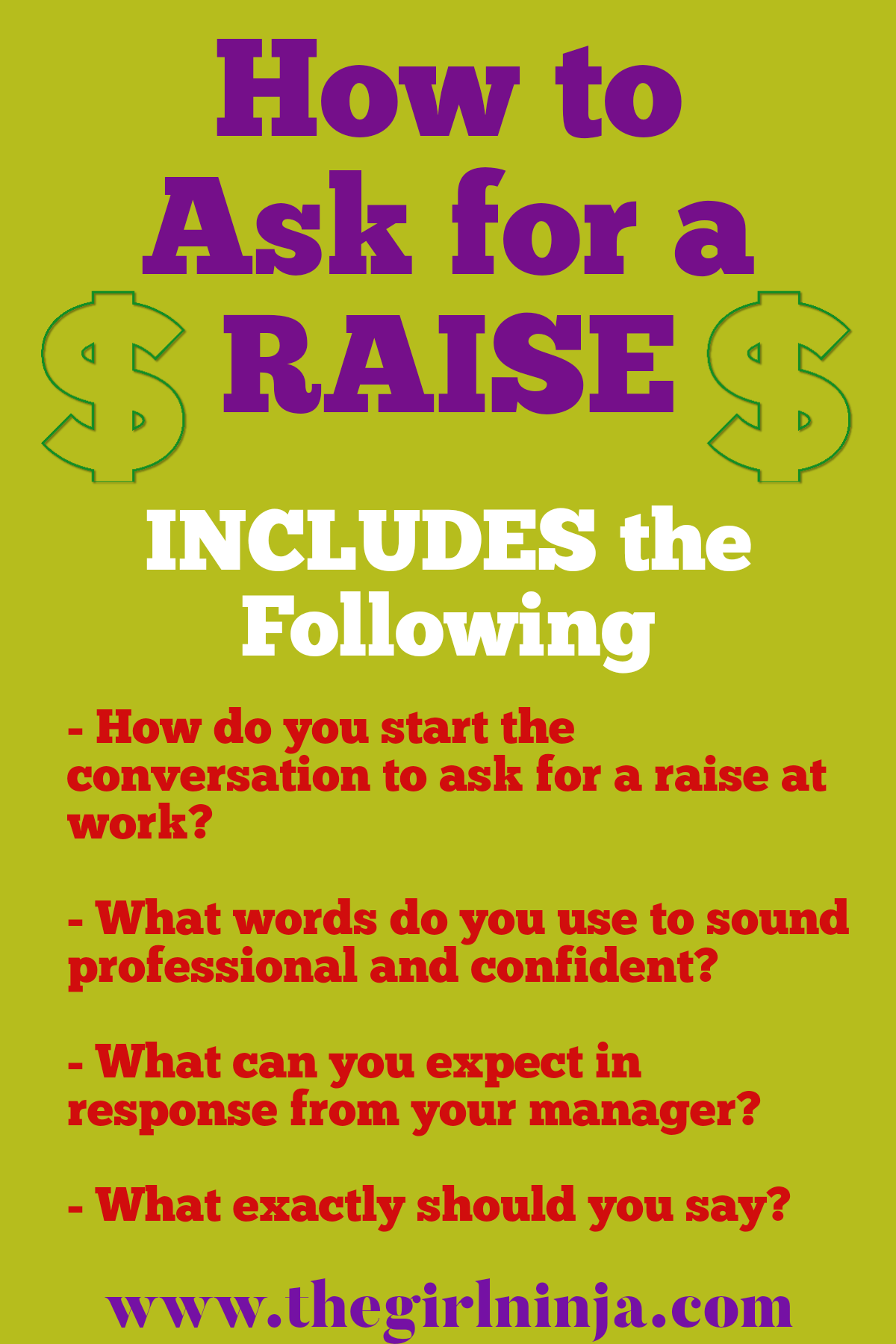
The most professional way to ask for a raise is with a growth mindset. Use the request as an opportunity to grow, specifically leveraging what you have given the company and what more you have to offer the company. To apply the growth mindset to salary discussions, it should be at minimum a bi-annual or quarterly discussion with your manager.
To initiate a growth mindset discussion around salary you can tell your manager in a one on one that you are interested in advancing your responsibility and salary. Inquire what your manager’s expectations are of you to be given more responsibility and an increase in salary. Before you ask for your manager’s expectations, it’s always good to propose some ideas of what steps you think you need to take.

Then follow up your ideas with asking for your manager’s feedback, alignment, and other expectations your manager has. Once you understand your manager’s expectations you should align with your manager on what specific actions you will take to meet your manager’s expectations. Following this meeting you should check-in with your manager in future one on ones (minimally bi-annually or quarterly) on your progress to ensure you are both aligned throughout the year.
Opening up a line of communication around yours and your manager’s expectations is important for your career growth. Making certain that both you and your manager are clearly communicating, and therefore aligned, is not always easy. It’s important to understand that business priorities change, and therefore your strategy to get a raise should be flexible or reflect the fluidity of business priorities. The changing needs of a business is why it’s important for you to have regular on-going discussions with your manager around expectations.
Know that getting a raise can be a process. If you truly feel that you have done everything outlined here, and your company is just making you jump through hoops with no recognition then it’s time you consider if that’s the kind of company you want to work for. If it’s not the kind of company you want to work for then flex your network, and start applying for positions that will give you a raise at a new company.
Below you can find specifics on what you should do before asking for a raise, as well as the details and examples of what to say when you ask for a raise.
When planning to ask for a raise you will want to do some prep work to advocate for yourself as well as ensure your expectations are realistic. Below are a list of 3 tips you can use to prepare to ask for a raise at work.
1) Know Your Industry Worth
Do your research and know the range of what others that are equal to your years of experience, education, and job title in your location are paid. Be realistic and know that you will need to stay within that range.
2) Assess Why You Feel That You Deserve Or Have Earned A Raise
a) Responsibilities (match them with a job description of a higher paid position)
b) Know Your Numbers
If you have made profits for your company or have saved your company money have value amounts to justify your request for a raise
3) Have Alignment and Recommendations
a) The easiest way to get a raise is to work with your manager to align on exactly what you need to do to get a raise. Then both of you are aligned on expectations. You can find more on how to align with your manager on work to obtain a raise at this post on Career Risks Pay Big.
b) Additional leverage to help support your request for a raise are recommendations. Have written recommendations from colleagues or mentors that give examples of exactly what you did that justifies increasing an employee’s salary.
After you do your research, comes the hardest part, actually having a conversation with your management requesting and justifying a raise in your salary. Some questions you might have are shown below.
How do you start the conversation to ask for a raise at work?

What words do you use to sound professional and confident?
What exactly should you say?
What can you expect in response from your manager?
Let’s go over all of those questions together with a specific scenario as an example. For our example we will use the ideal situation where you previously discussed a raise with your manager, and aligned on specific achievements you would deliver. Specifically, in this situation you came to an agreement that after you delivered those specific achievements you would get a raise.
How do you start the conversation to ask for a raise at work?
In this case you might start the conversation out with something like the below statement.
“I would like to discuss the achievements we aligned on in regards to a raise in my salary, please let me know if this time/date works for you.”
Notice that you proposed a time and date (it should be about 15-30minutes), this prevents you from waiting for them to have to propose a time and date. Hopefully they can accept that proposed time, if not then work with them to find a time that does work.
What exactly should you say?
Like any other conversation with a human being it is expected that you run through the social practice including saying hi and asking how they are doing. It also helps to ask them a personal question to show you have interest in them. Personal questions should obviously still be work appropriate and should be based on topics you have learned from chatting with your manager. For example, if you know they have children maybe ask how their kids are doing, or if they are planning a vacation maybe ask if they have any special plans for their break.
Once you get through the expected social exchanges you can shift gears by saying something like,

“I know you are busy so I will jump into the planned meeting topic.”
Below are statements that you can use to help the discussion flow and stay focused. Be sure to note that you should begin and end the discussion by thanking them for their time and willingness to discuss your salary.
“Thank you for taking time to discuss my salary with me.”
“Last time we discussed my salary we aligned on this list of particular achievements that I needed to deliver before you could recommend me for a salary raise.”
“I am proud to say that I have delivered on each of those achievements, here are the dates they were completed and notes on each.”
This is something tangible that you can show your manager. Have a table that lists the aligned on achievements, the date completed, and a column for notes on the outcome or result from your action. Specifically, that last column should highlight what you gave the company by completing the achievement. For example: any money you made or saved the company or how you improved morale or culture etc.
What words do you use to sound professional and confident?
At this meeting you should have notes that list the aligned achievements from the previous time that you met to reference and share with your manager. As a matter of fact it is a good idea that after you and your manager agree on those achievements you send them a copy of your notes. Email is probably best practice here so there is an electronic record of when you sent them and to whom.
Having well documented notes will showcase your professional organization and communication strengths. In addition to well documented notes you will want to practice the suggested statements above and tweak them to be specific to your situation if possible. If you are not using the example statements given above be sure to still practice what you want to say. The clearer you are while balancing details and being concise the more professional you will sound.
Questions
Another way to sound professional and confident is to ask questions. You will want to understand the process for getting a raise so you are not asking your manager at inappropriate times for updates. Understanding the process will also help prevent you from getting frustrated at your manager for not giving you a final answer in what you think is a timely fashion.
Some questions you can ask are shown below.
“I am unfamiliar with the raise process at this company, can you explain to me what you need to do when you request a raise?”
“Is there anything I can do to help you with the process of requesting a raise for me?”
“Who are the final decision makers on whether I get a raise or not?”
“What does the timeline look like? More specifically, when can you make the request and how long will it take for the decision makers to make a decision and get back to you?”
You won’t want to ask all your questions at once so be sure to ask one at a time and give your manager time to respond before giving them another question.
What can you expect in response from your manager?
This section will elaborate on what you can expect from your manager. Please note that expectations will vary greatly from one place of work to the next, and can also vary greatly depending on your professional level. I will give some general expectations here, and hopefully your expectations will be clear after talking with your manager.
You should expect that your manager will be honest with you about whether or not a raise is realistic and why. If you do not trust your manager to be honest, this will be a very difficult process. You should know that you cannot change your manager’s honesty. So, in this situation if you are unhappy the best thing you can do is look for a new job with a manager you can potentially trust.

You should expect that your manager may not be able to request your raise right away and get a quick response. Most companies have a specific time of year they will take requests for raises, so you both may have to wait for that time to come around. After a request is put in, you then have to wait for the decision makers to meet and come to a decision. Again, the decision is typically made at specific meetings that are only scheduled at predetermined times of the year. This may be a week or months after the request is made.
Overall, the expectation is this is a process and you may have to wait a while for a response. So be sure to be realistic about when you will be able to get a raise or feedback on what you need to do to get a raise. You also have to expect that your request for a raise may be rejected. In this situation you will want to be sure to understand if there is feedback on what you need to do to get a raise. If there is no feedback it is reasonable to ask your manager to explain the reason they are not giving you a raise. It could be something as simple as business performance, and raises are not currently something the company can afford.
The more questions you get answers to, and the better you understand the overall process, the less likely you will experience stress when it comes to discussions asking for a raise.
Another expectation is that your manager and the company that you work for is not magical. If they do not give you what you want and what you feel you deserve then the best thing you can do is find another location or another company that will give you what you want and deserve. Depending on what industry you are in, it is very common to move companies or locations every 2 – 5 years.


